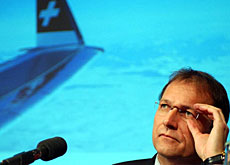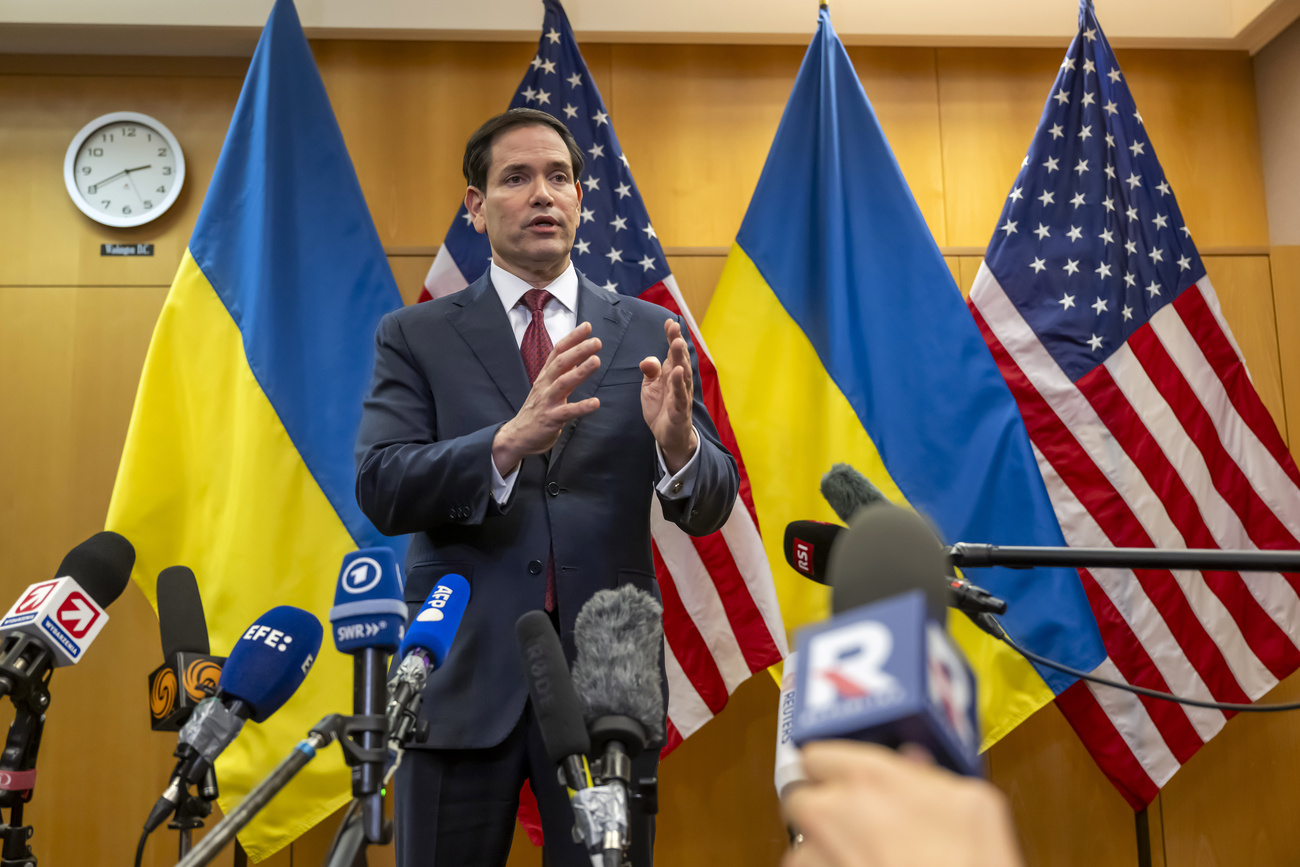
Swiss boss masters management of decline

For André Dosé, arguably Switzerland's most exposed boss, running the airline Swiss is like coaching the national soccer team - everybody else knows best.
In an exclusive interview with swissinfo, Dosé defended the company’s decision to rethink its direction after a last year’s billion-franc loss.
“It’s not exactly a pleasure, and sometimes not very motivating, to work in an industry where you basically destroy value every day,” Dosé says.
Halting the airlines’ prodigious cash-burn is made more difficult by the fact that ordinary Swiss citizens – whose government invested heavily in Swiss – are constantly looking over his shoulder.
“If you run the airline in Switzerland… you cannot hide. You’re part of the system. Everybody knows better, everybody tells you who should play centre-forward and defence,” Dosé says.
Faced with high oil prices, a war in Iraq, and collapsing demand in key European markets, Dosé and his team are fighting for survival exactly one year after the company’s launch.
At last week’s annual results meeting, Swiss said it had cancelled orders for 30 new aircraft.
The airline has also cut 1,000 jobs and is slashing dozens of regional routes in an effort to save SFr500 million ($364 million) in 2003.
Buying time
Furthermore, Swiss management is seeking shareholder approval for a controversial plan to cut the nominal value of its shares from SFr50 to SFr32.
The move is an attempt to grant the airline breathing space. Swiss law requires that companies maintain a net equity of more than 50 per cent.
If Swiss fails to stem its loses – something Dosé admits will not happen this year – the taxpayer’s willingness to inject more money into the airline could be sorely tested.
One strategy the airline hopes will trigger a turnaround is its newfound desire to chase budget passengers.
Swiss plans to expand its sales of cut-price tickets on high-volume European routes such as Zurich-Paris or Zurich-Copenhagen. It hopes to regain markets annexed by budget airlines such as easyjet.
Dosé says he has little choice but to follow a virtual “two airlines” strategy.
One side of the business will focus on what Switzerland’s national airline has always done – high-quality services for a premium price, while the other sells cut-price tickets directly over the Internet.
“That’s easier said than done. I admit that,” says Dosé.
“But I’m convinced that most of the traditional network carriers will try to exploit this area, and I think it’s very important that we’re very fast with this.”
Fading dream
It’s a bitter pill for those who remember the glory days of Swiss’s predecessor, Swissair, an airline that traded on its reputation for quality and exclusivity. Many of those same people had hoped Swiss would continue the tradition.
The Zurich-based style oracle, Tyler Brûlé, who was hired by Swiss to come up with its brand name and livery, imagined an airline for people who “want to turn left” (into first class) when they board.
Dosé, who insists he does not want to jeopardise the Swiss brand name, says harsh economic realities have dictated the change in direction.
“Only stupid people don’t change and adapt to the market,” Dosé says.
“If the circumstances were today as they were back in October 2001, when we did the business plan, it would be difficult enough to build a new company.”
With airlines around the world struggling for survival, Dosé says 2003 will be the industry’s most difficult ever.
To big, too soon
Which begs the question: have Swiss taxpayers – who invested around SFr1 billion in the new airline – been duped into backing a white elephant? Could it not have been launched on a more modest scale?
“I did not know then how the market was going to degrade and how fast,” says Dosé.
“You could have said let’s start with a smaller size[d] airline and a regional [network]…but that was not the case back then.
“With such a huge task you’re bound to make mistakes and we committed our share of mistakes. [But] you have to correct them when you see them,” he adds.
One mistake is Swiss’s failure to join one of the two big network alliances, Oneworld and Star Alliance.
Dosé’s ambitions of joining Oneworld, a move that would save millions in shared ticketing, marketing and handling costs, have been repeatedly blocked by British Airways.
This year, Dosé, hopes to break into the club by negotiating bilateral agreements with most of Oneworld’s eight members.
Public doubt
Dosé has plenty of critics in the Swiss media, who condemn the airline as a bad business idea kept airborne by a politically motivated desire for a national carrier.
He responds by pointing out its importance to the national economy – and does not rule out asking for more public money if things do not improve.
One year on from last year’s high profile launch, Dosé has spent much of the year flying into a strong headwind of public doubt.
“It’s very difficult to cope with the fact that every Swiss citizen knows you. I think more school children know the boss of Swiss than the president’s name.”
“That’s reflected in my daily life… I cannot go into the city and have a cup of coffee peacefully.”
Keeping it simple
Whether he succeeds or not, Dosé gives the impression of someone determined to build a new airline, rather than replica of Swissair.
His office, with a view of the landing apron at Zurich’s airport, is basic. Posters of Swiss aircraft, still in their bubble wrapping, are propped up in the corner, waiting to be hung.
There are no signs of the corporate luxury and elitism sometimes associated with Swissair before its collapse.
“It’s simply due to the fact that we can’t afford such a thing,” he laughs. “The flamboyant times of the airlines, with big entrances and fancy buildings, are long gone.”
swissinfo, Jacob Greber
Swiss launched on April 1, 2002
The company was formed following the collapse of Swissair in 2001.
In 2002, it had a net loss of SFr980 million ($714 million)
CEO André Dosé says 2003 will be airline industry’s worst year in history.
Over 30 per cent of Swiss shareholders are federal and cantonal governments.
Swiss operates 133 aircraft, 26 of those for long-haul flights.
It recently announced plans to cut the nominal value of its shares from SFr50 to SFr32.

In compliance with the JTI standards
More: SWI swissinfo.ch certified by the Journalism Trust Initiative




























You can find an overview of ongoing debates with our journalists here . Please join us!
If you want to start a conversation about a topic raised in this article or want to report factual errors, email us at english@swissinfo.ch.